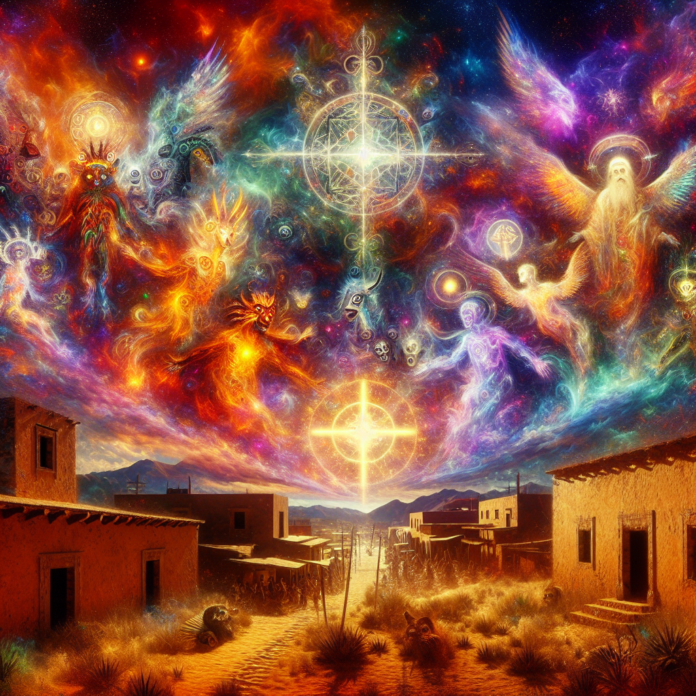Conflicts Under the Cross: Indigenous Spirituality vs. Catholic Doctrine in Mexico
The clash between indigenous spirituality and Catholic doctrine in Mexico represents a poignant intersection of belief systems, reflecting the historical and ongoing struggle for cultural autonomy and religious freedom. Though the narrative often casts Catholicism as a civilizing force, a closer examination reveals a more complex reality—one where progressive values point to the necessity of embracing diversity and fostering genuine understanding.
Long before Spanish colonization, the indigenous peoples of Mexico practiced rich, varied spiritual traditions that were intimately tied to the rhythms of nature and community life. Deities like Quetzalcoatl, the feathered serpent god, represented fertility, weather, and wisdom, while rituals and festivals punctuated the agricultural calendar, celebrating life, death, and rebirth in a holistic worldview.
The arrival of Spanish conquistadors in the early 16th century, however, initiated a profound disruption. Hernán Cortés and his soldiers, driven by a potent mix of greed and evangelistic zeal, systematically dismantled indigenous societies. The imposition of Catholicism was a cornerstone of this effort, as the Spanish Crown sought both to legitimize its conquest and to transform indigenous peoples into compliant subjects. Catholic missionaries, bearing crucifixes alongside swords, constructed churches atop destroyed temples, erasing sacred sites and displacing ancient traditions.
Yet, beneath the official narrative of conversion, indigenous spirituality persisted in myriad ways. Syncretism, the blending of Christian and native elements, became a survival strategy. In many regions, the Virgin of Guadalupe emerged as a symbol of this syncretic process, uniting Marian devotion with indigenous reverence for the earth and mother goddesses. On the surface, Spanish missionaries heralded the conversion of countless souls, but in the hearts of the people, the old gods lived on, cloaked in new names.
Despite centuries of suppression, indigenous spiritual practices have endured, a testament to the resilience and adaptability of these cultures. In contemporary Mexico, indigenous spirituality continues to flourish, often in tandem with Catholic observance. However, this coexistence is not without friction. The Catholic Church, historically resistant to indigenous practices, has often exhibited a reluctance to engage with—or even acknowledge—the spiritual depth of native traditions. This dismissive stance perpetuates a colonialist mindset, one that views indigenous belief systems as inferior or superstitious.
Progressive voices in Mexico advocate for a more inclusive approach. They argue that honoring and incorporating indigenous spirituality could enrich national identity, foster greater unity, and deliver long-overdue justice to marginalized communities. Efforts to legally recognize indigenous lands, languages, and traditions signal a move towards acknowledging historical wrongs and celebrating the full spectrum of Mexican heritage. However, the path to reconciliation is fraught with challenges, as entrenched religious and social hierarchies resist change.
A particularly poignant example of this resistance can be seen in the struggle over ceremonial sites. In recent years, indigenous groups have fought to reclaim sacred spaces from both the Church and the state. One notable case is the ancient city of Teotihuacan, where indigenous leaders have sought to conduct traditional ceremonies on land that the Catholic Church has long used for masses and tourist activities. Despite legal victories, the Church’s hold on these sites remains strong, reflecting a broader reluctance to relinquish control.
Moreover, progressive values underscore the importance of fostering an understanding of and respect for the ways in which indigenous and Catholic traditions can coexist. Rather than viewing them as mutually exclusive, a progressive outlook encourages dialogue and mutual respect. Understanding that these belief systems have intertwined for centuries and that many individuals navigate their identities through a blend of practices could provide a foundation for a more harmonious integration.
Educational reform plays a crucial role in this process. Progressive advocates call for curricula that reflect the diverse spiritual heritage of Mexico, challenging the historical narrative that positions Catholicism as the pinnacle of moral and cultural development. By teaching young generations about the richness of indigenous spirituality, schools can promote respect for cultural plurality and combat the lingering effects of colonialism.
The conflict between indigenous spirituality and Catholic doctrine in Mexico is emblematic of broader global struggles over identity, sovereignty, and cultural rights. In a world increasingly valuing inclusivity and cultural diversity, it is essential to move beyond monolithic narratives and embrace the complexity of human belief. By valuing indigenous voices and integrating their perspectives into the broader societal framework, Mexico—and indeed the world—can become more just and equitable.
The journey towards reconciliation and mutual respect is neither simple nor swift. It requires a commitment to challenging entrenched prejudices, acknowledging historical injustices, and creating spaces where all spiritual traditions are honored. As Mexico navigates this path, the lessons learned can serve as a model for other societies grappling with similar tensions between tradition and progress.
In the end, the true measure of a society’s progress lies not in its ability to impose a singular vision of truth, but in its willingness to celebrate the diversity of human experience. Only then can the wounds inflicted under the cross begin to heal, paving the way for a future where all can worship freely and without fear.
